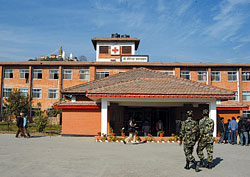|
|
| Birendra Military Hospital in Kathmandu |
Two thousand Nepali soldiers were used to test the vaccine developed for the US Army in clinical trials in 2001-2003. One thousand soldiers received vaccine injections on day one, after one month and then six months later. The remaining 1,000 soldiers got placebos.
The company developing the vaccine, GlaxoSmithKline, announced in December that the drug had proven 96 percent effective and that it would take the next steps to market it. Critics have asked whether the soldiers were properly informed and whether Nepalis would benefit. The government says it must balance ethical concerns with the need to acquire medical know-how.
The field trial was organised by the Thailand office of the US Armed Forces Research Institute of Medical Sciences, which set up the Walter Reed-AFRIMS Research Unit Nepal (WARUN) in Kathmandu in 1995. The army had long wanted a drug to combat Hepatitis E, a water-borne disease that causes half of all hepatitis cases in developing countries such as Afghanistan, where the US military is increasingly active, and targets the 16-40 age group. Those affected are sick for two-six weeks with symptoms that include nausea, vomiting, fever, abdominal pain and fatigue.
A vaccine was developed by the US National Institutes of Health and the first field trials were carried out in the US and on dozens of Nepalis living in Lalitpur in 1998. Nepal was chosen because Hepatitis E is endemic here.
The results of the US-Nepal trials were encouraging so WARUN readied another trial on 2,000-3,000 locals in Lalitpur. But people there began asking questions, such as how they would benefit from lending their bodies to science. Soon the media and NGOs heard of the plans and the field trial was moved when WARUN teamed up with the Royal Nepali Army to test it on soldiers.
The coordinator of the ethical review board at Nepal's National Health Research Council (NHRC) told us the soldiers were fully informed about how the trial would work and what the risks and benefits were. "There was some confusion about whether a captive audience could be willing subjects. We went to the army, we talked to some of the recruits, casually as if we were just visiting doctors. They said they were asked and consented voluntarily," says Ramesh Kant Adhikari.
Lumanti is one of the NGOs that had questioned the planned trial in Lalitpur. "You'll have to ask the soldiers how much they understood about the tests," says Executive Director Lajana Manandhar. "Our concern (in Lalitpur) was that the process followed was not ethical. The volunteers had signed an agreement without knowing what they had signed because they were either illiterate or semi-illiterate."
The NHRC had ethical guidelines for research when the Hepatitis E vaccine (HEV) trials began. But they were probably not widely disseminated, says Adhikari, who is also dean of the Institute of Medicine at Teaching Hospital. Today's standard is the National Ethical Guidelines for Health Research in Nepal, first published in 2001. "If this proposal came to us now, we would ask 'how are you going to ensure that our people can make use of this vaccine'? But probably at that time the question was not asked," Adhikari added.
The NHRC today would also ensure that local researchers benefited substantially. "All the (HEV) results are being taken to Bangkok so nothing is going to be left behind for strengthening our intellectual capacity," he said.
Jason Andrews, a medical student at Yale University, raised such questions in a 2005 article in the American Journal of Bioethics. The Lalitpur community was sceptical about the trials because people felt that they lacked transparency and that they had been excluded from the planning process, he wrote.
'Concern about benefits was particularly legitimate,' Andrews added, 'in light of similar vaccine trials (for Hepatitis A, Japanese encephalitis, and typhoid) carried out by AFRIMS, which resulted in profitable traveller's vaccines that have proven too expensive for public distribution in the country in which they were tested'. The typhoid vaccine was developed in Nepal but is used mostly by tourists here, he added.
According to Adhikari, "the Hepatitis E vaccine would be very useful here. Fatality is very high if the disease occurs in pregnant women." He added, "we have been raising this question. If the vaccine is $ 60, what is its use for Nepali people? But the researchers haven't been able to say if it will be available here."
Andrews also asked if the Nepali Army, which received millions of dollars worth of weapons and training from the US military, was in a position to say no to Uncle Sam. 'Based on prior studies between the Royal Nepali Army and AFRIMS that demonstrated the high risk of hepatitis E to RNA soldiers, the RNA chose to collaborate with the US Army,' the US Embassy in Kathmandu told us in an email.



